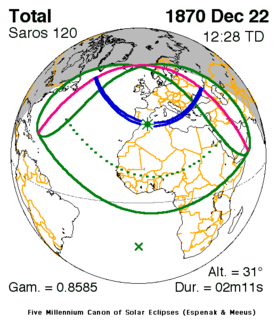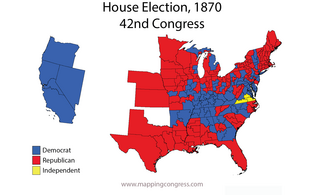
The Fifteenth Amendment to the United States Constitution prohibits the federal government and each state from denying a citizen the right to vote based on that citizen's "race, color, or previous condition of servitude". It was ratified on February 3, 1870, as the third and last of the Reconstruction Amendments.

The Franco-Prussian War or Franco-German War, often referred to in France as the War of 1870, was a conflict between the Second French Empire and later the Third French Republic, and the German states of the North German Confederation led by the Kingdom of Prussia. Lasting from 19 July 1870 to 28 January 1871, the conflict was caused by Prussian ambitions to extend German unification and French fears of the shift in the European balance of power that would result if the Prussians succeeded. Some historians argue that the Prussian chancellor Otto von Bismarck deliberately provoked the French into declaring war on Prussia in order to draw the independent southern German states—Baden, Württemberg, Bavaria and Hesse-Darmstadt—into an alliance with the North German Confederation dominated by Prussia, while others contend that Bismarck did not plan anything and merely exploited the circumstances as they unfolded. None, however, dispute the fact that Bismarck must have recognized the potential for new German alliances, given the situation as a whole.

An ironclad is a steam-propelled warship protected by iron or steel armor plates used in the early part of the second half of the 19th century. The ironclad was developed as a result of the vulnerability of wooden warships to explosive or incendiary shells. The first ironclad battleship, Gloire, was launched by the French Navy in November 1859. The British Admiralty had been considering armored warships since 1856 and prepared a draft design for an armored corvette in 1857; in early 1859 the Royal Navy started building two iron-hulled armored frigates, and by 1861 had made the decision to move to an all-armored battle fleet. After the first clashes of ironclads took place in 1862 during the American Civil War, it became clear that the ironclad had replaced the unarmored ship of the line as the most powerful warship afloat. This type of ship would come to be very successful in the American Civil War.

Gravelotte is a commune in the Moselle department in Grand Est in north-eastern France, with a population of 652 by 1999.

The Forty-first United States Congress was a meeting of the legislative branch of the United States federal government, consisting of the United States Senate and the United States House of Representatives. It met in Washington, D.C. from March 4, 1869, to March 4, 1871, during the first two years of Ulysses S. Grant's presidency. The apportionment of seats in the House of Representatives was based on the Eighth Census of the United States in 1860. Both chambers had a Republican majority.

The United States Census of 1870 was the ninth United States Census. Conducted by the Census Bureau in June 1870, the 1870 Census was the first census to provide detailed information on the black population, only years after the culmination of the Civil War when slaves were granted freedom. The population was said to be 38,555,983 individuals, a 22.62% increase since 1860. The 1870 Census' population estimate is controversial, as many believed it underestimated the true population numbers, especially in New York and Pennsylvania.

The 1870 New York state election was held on November 8, 1870, to elect the Governor, the Lieutenant Governor, the New York State Comptroller, two Canal Commissioners and an Inspector of State Prisons, as well as all members of the New York State Assembly.

The 1870 South Carolina United States House of Representatives elections were held on November 1, 1870 to select six Representatives for two-year terms from the state of South Carolina. The fifth and sixth seats were decided by an at-large election, but the House of Representatives refused to seat the two winners. The two incumbents who ran were re-elected and the two open seats were retained by the Republicans. The composition of the state delegation thus remained solely Republican.

The Enforcement Act of 1869, also known as the Civil Rights Act of 1870 or First Ku Klux Klan Act, or Force Act was a United States federal law written to empower the President with the legal authority to enforce the first section of the Fifteenth Amendment throughout the United States. The act was the first of three Enforcement Acts passed by the United States Congress from 1870 to 1871 during the Reconstruction Era to combat attacks on the suffrage rights of African Americans from state officials or violent groups like the Ku Klux Klan.
The 1870 college football season is regarded as the second United States intercollegiate football season. The season involved only three teams and two known games which took place in November 1870. As in 1869, the season’s two games occurred about fifteen miles apart in New Brunswick and in Princeton, New Jersey.
The Kirk–Holden War was a struggle against the Ku Klux Klan in the state of North Carolina in 1870. The Klan was using intimidation to prevent recently-freed slaves from exercising their right to vote. Republican Governor William W. Holden hired Colonel George Washington Kirk to handle the matter. He also suspended the writ of habeas corpus, and imposed martial law in Caswell and Alamance counties in response.

A special judicial election was held on May 17, 1870, to fill the seats on the re-organized New York Court of Appeals.

A total solar eclipse occurred on December 22, 1870. A solar eclipse occurs when the Moon passes between Earth and the Sun, thereby totally or partly obscuring the image of the Sun for a viewer on Earth. A total solar eclipse occurs when the Moon's apparent diameter is larger than the Sun's, blocking all direct sunlight, turning day into darkness. Totality occurs in a narrow path across Earth's surface, with the partial solar eclipse visible over a surrounding region thousands of kilometres wide.
Totality was visible from southern Portugal and Spain, across northern Algeria, then crossing Sicily, Greece, Bulgaria, and ending in Ukraine.
In the United States Senate elections of 1870 and 1871, the Republican Party lost five seats in the United States Senate, though it still retained an overwhelming majority. In advance of these elections, the last four seceded states were readmitted to the Senate.

The 1870 United States elections occurred in the middle of Republican President Ulysses S. Grant's first term, during the Third Party System. Members of the 42nd United States Congress were chosen in this election. The election took place during the Reconstruction Era, and many Southerners were barred from voting. It was also the first election after the passage of the 15th Amendment, which prohibits state and federal governments from denying the right to vote on the basis of race, color, or previous condition of servitude. The Republican Party maintained a majority in both houses of Congress, although Democrats picked up several seats in both chambers.
The 1870 Victorian football season was an Australian rules football competition played during the winter of 1870, consisting of matches between metropolitan football clubs in Melbourne in the colony of Victoria. The premier club was Melbourne.

Elections to the United States House of Representatives were held in 1870 and 1871 to elect Representatives for the 42nd Congress, and were held in the middle of President Ulysses S. Grant's first term.
Elections to Liverpool Town Council were held on Monday 1 November 1870. One third of the council seats were up for election, the term of office of each councillor being three years.
Nine of the sixteen wards were uncontested.
Elections to Liverpool Town Council were held on Monday 1 November 1869. One third of the council seats were up for election, the term of office of each councillor being three years.












